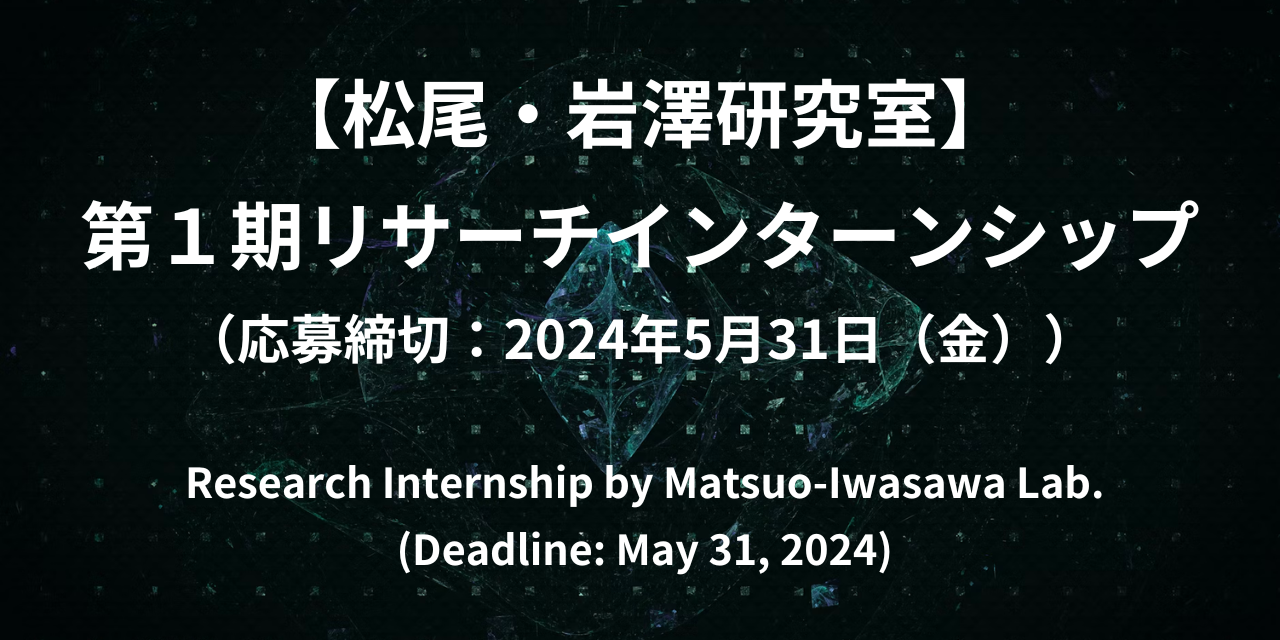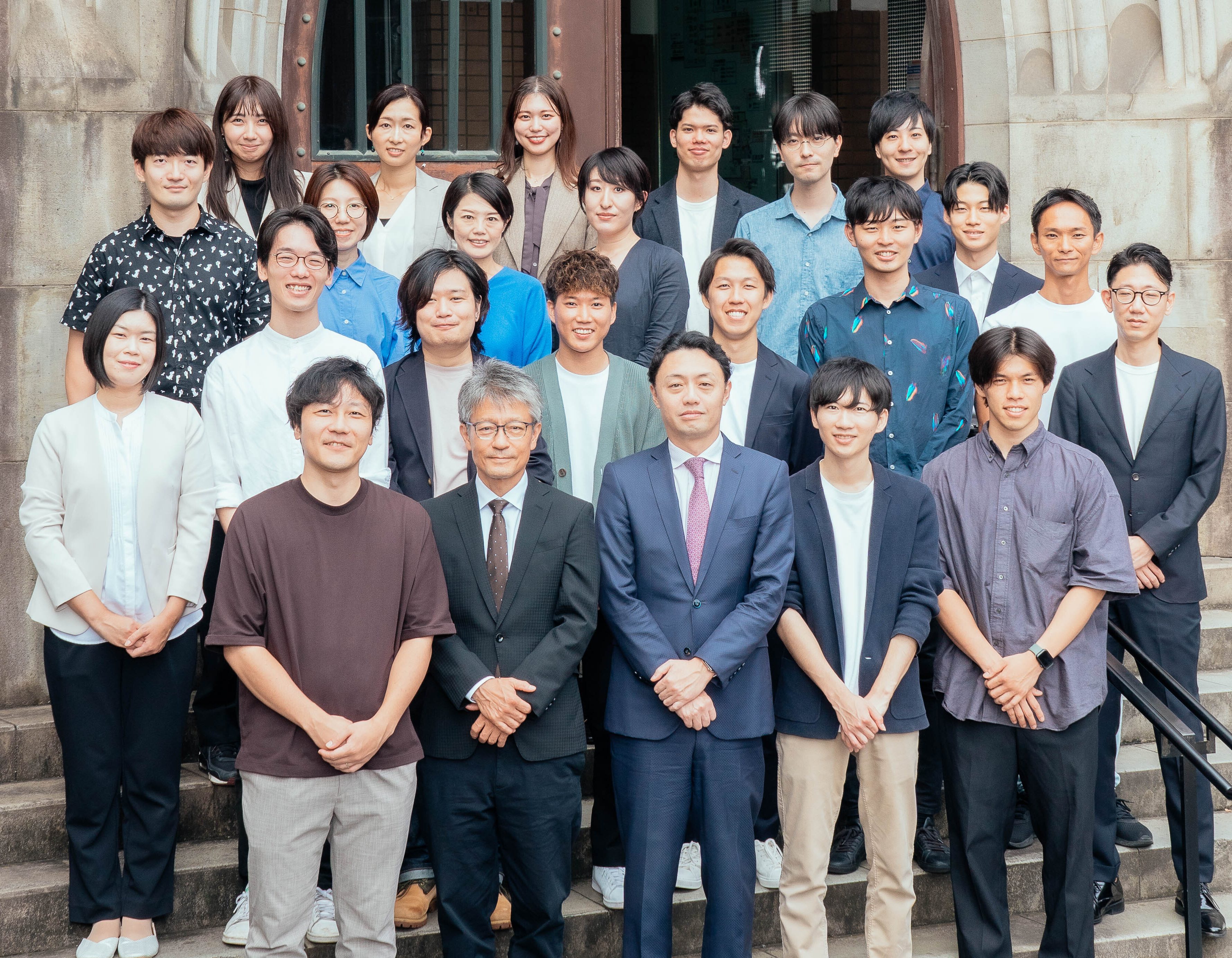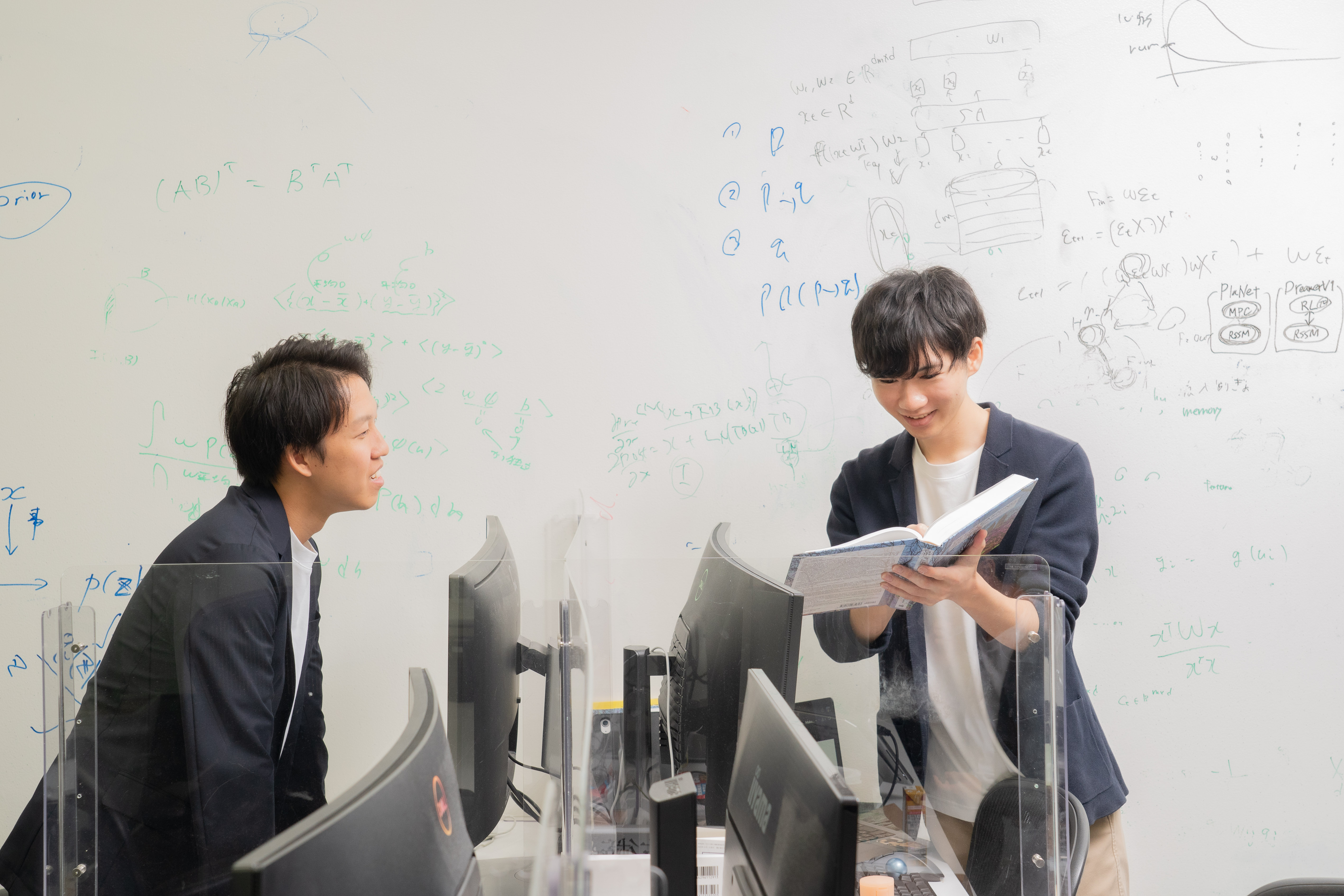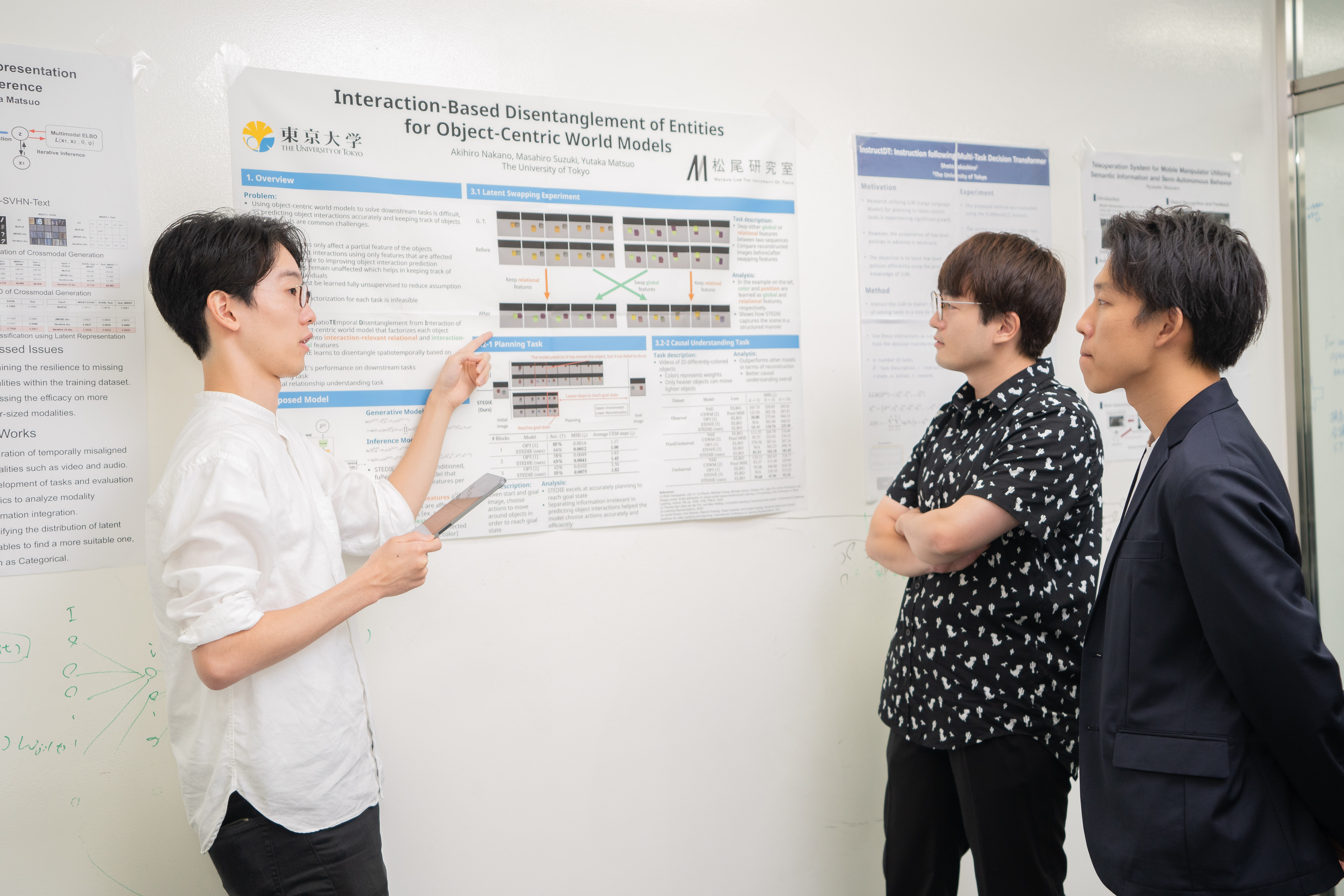■ About us
The Matsuo-Iwasawa Lab at the University of Tokyo operates under the mission of “Reproduce human intelligence through Deep learning” and engages in a wide range of research areas, including the development of deep learning and foundational technologies beyond it, such as world models, robotics, large-scale language models, and societal implementation of algorithms. With over ten full-time researchers (and plans to continue increasing this number), the lab had 14 papers accepted at top conferences like ICML, ICLR, NAACL, and ICRA in the fiscal year 2023. (Our current research achievement can be found here)
To expand these activities further, the lab is launching the first phase of its research internship program. Under the mentorship of researchers active at the forefront of each field, interns will experience research activities within the lab that are usually not visible from the outside.
■ Research Internship Overview
Interns will work on various research topics alongside the lab’s researchers. The research outcomes may be aimed for submission and acceptance at top academic conferences and journals, with the lab covering all related expenses for conference attendance and travel. The specifics of the internship period, hours, and other kind of supports will be discussed individually.
It is encouraged to publish the outcomes of the internship within permissible legal and intellectual property rights as open-source software, papers, or articles on the Matsuo-Iwasawa Lab website.
Application Form (Deadline: May 31, 2024):https://forms.gle/3XatHYQFemCVeh5F9 ※Application was closed
Internship Themes:http://weblab.t.u-tokyo.ac.jp/wp-content/uploads/2024/05/Intern_English.pdf
【Internship Details】
- Position: Research Intern
- Contract Type: Out Sourcing Contract (No Social Insurance)
- Duration:7 weeks between July 1, 2024, and October 31, 2024
- Compensation:¥500,000 per month (¥125,000 per week)
-
Expected Activity Hours: Approximately 40 hours per week (excluding weekends and holidays); start and end dates are negotiable
- Eligibility:
-
Enrolled in a master’s or doctoral program (undergraduates may also apply)
-
Have research experience or a strong interest in related fields
-
- Research Areas/Themes:
- Themes of Research Intern
-
The list of research themes for the internship can be selected during the application process. The final decision is made in consultation with the lab members.
-
Applicants are advised not to bring in research themes from their institutions.
- Number of Positions: Several, depending on the theme
- Mode of Participation: Both on-campus and online formats are possible
- ※Flexible participation methods are considered for those from overseas or remote areas
- ※Depending on the theme, you may be required to attend in person.
- ※For those living far (approx. outside a 200 km radius from the University of Tokyo) and preferring the on-campus format, accommodation support (including communication costs) is provided
- Location (if on-campus):
-
Matsuo-Iwasawa Lab, 9th Floor, Engineering Building 2, Hongo Campus, The University of Tokyo, 93C1
- Matsuo-Iwasawa Lab robot lab
-
Nagase Hongo Building 9th floor, Bunkyo-ku, Tokyo
-
-
- Other:
-
Travel expenses from your country to Japan are fully covered
-
Visa and housing support provided (ex., visas, housing, registration of residency, and so on).
-
(If you wish to come to Japan to participate in the internship), takes time approx. 2 months.
-
Work PC provided
-
International conference fees are covered upon paper acceptance
-
Participation in lab events and partial access to lab welfare systems
-
Intellectual property generated during the internship will belong to the University of Tokyo
-
All terms are based on the lab’s regulations
-
- Application Method: Apply via the form, submission of CV/research accomplishments required
【Schedule】
-
Application Period :April 15 – May 31
-
Notification of CV Screening Results :June 6
-
First-round Interviews:Scheduled for June 12 from 13:00 to 15:00 (subject to change if many applications are received)
-
Final Selection Notification :June 14
-
Internship Period :7 weeks between July 1 and October 31
【Selection Process】
-
CV screening → Online interviews (approximately two, including discussion of research themes) → Notification of acceptance/rejection
- Approx. 1 months
【Q&A】
-
Can the duration of the research internship be changed?
-
The internship is typically scheduled for two months. However, based on your circumstances (including visa issues), you can discuss adjustments to the duration and hours of activity.
-
-
How much is the living cost in Japan?
-
Please refer to the article “For International Researcher Candidates – Life in Japan”.
-
-
If I visit Japan to participate in the internship, how long will it take to obtain a visa?
-
It takes approx. 2 months at least.
-
- Is it possible to participate in the research internship fully remotely?
-
Yes, full remote participation is possible.
-
-
Can the internship period be extended?
-
Extensions may be discussed depending on the progress of your research project. Any changes to the methodology and hours of the research project will be considered as needed.
-
-
What does a typical day look like during the internship?
-
The day-to-day schedule generally involves consultations with the mentor. Regular meetings are held to check progress and discuss research directions.
-
-
Is there a possibility that the internship recruitment will close early?
-
Yes, once capacity is reached, the application might close early, so please apply as soon as possible.
-
-
Can the research theme worked on during the internship be developed into a thesis topic at the home institution?
-
If an intern wishes to develop their research theme from the internship into a master’s or doctoral thesis, consultation with their university supervisor is necessary.
-
-
Is it permissible to participate in another company’s internship during the research internship period?
-
Due to visa regulations limiting the number of allowable work hours, concurrent participation in another internship is effectively impossible.
-
Application Form (Deadline: May 31, 2024):https://forms.gle/3XatHYQFemCVeh5F9 ※Application was closed
Internship Themes:http://weblab.t.u-tokyo.ac.jp/wp-content/uploads/2024/05/Intern_English.pdf
■ Example of research project in Matsuo-Iwasawa Lab
- World Model
-
In our lab, we engage in the study of world models, utilizing deep learning to model the real world and infer or predict its representation. Our research focuses on developing world models that understand and predict the interactions among multiple objects in an environment and scaling up these models. We also conduct studies on the crucial aspect of handling time within these models.
-
- Large Language Model, LLM
-
Our lab has conducted significant research demonstrating the importance of prompt engineering in harnessing the inference capabilities of LLMs. We have developed our own large-scale language model, Weblab-10B. Recently, we have been working on studies related to adversarial learning and the principles of in-context learning aimed at enhancing control and understanding of large language models.
-
- Algorithm
-
Our lab aims to develop deep learning algorithms that go beyond traditional error backpropagation, simulating more closely the human brain’s parallel processing capabilities. Specifically, we are exploring backprop-free learning methods based on energy-based models and searching for good substructures within networks based on the Strong Lottery Ticket Hypothesis.
-
- Robotics
-
We utilize large-scale data collected from real-world robots and simulators for machine learning-based robot control, focusing on imitation learning and reinforcement learning. Our research aims to create versatile robotic systems capable of handling diverse tasks and environments, such as home settings. Recently, our lab has been involved in building foundational models for robotics using large-scale data, robot data collection via teleoperation, and integrating foundational models like LLMs with robotic systems. In the summer of 2023, our lab won third place at a global competition using Toyota’s HSR service robots and first place at a national competition in Japan.
-
- Social Implementation
-
We are dedicated to addressing societal challenges through deep learning and machine learning technologies. Despite the rapidly increasing demands for computational resources and data sizes, especially following the advent of LLMs and foundational models, many industries do not have adequate environments. Our research also focuses on methodologies that function effectively under such constraints.
-
- Brain Models
-
In this role, hypothetical computational models of crucial brain regions such as the neocortical inter-area, local circuits of the neocortex, cerebellum, basal ganglia, hippocampus, and amygdala are designed. This involves understanding how these parts interact and function as a whole and modeling these interactions.
-
Required Skills: Candidates interested in deeply understanding neuroscience papers and considering computational models based on anatomical structures. We seek individuals capable of discussing the modeling of complex biological systems.
-
Inquiry for this internship programs:reseach-intern@weblab.t.u-tokyo.ac.jp





